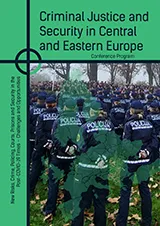15th Biennial International Conference
Criminal Justice and Security in Central and Eastern Europe
New Risks, Crime, Policing, Courts, Prisons and Security in the Post-COVID-19 Times - Challenges and Opportunities
Ljubljana, 8–10 September 2025

Welcome to the conference webpage
Welcome to the 15th Biennial International Conference on Criminal Justice and Security in Central and Eastern Europe, organized by the Faculty of Criminal Justice and Security of University of Maribor, Slovenia. This conference focuses on the contemporary security landscape in Europe and beyond, marked by numerous uncertainties and emerging forms of deviance and crime, including cybercrime, migration-related offences (such as migrant smuggling), and environmental threats.
The primary aim of the 15th biennial Conference is to share the latest views, concepts, and research findings from criminal justice studies on security and criminology by scientists, researchers, and practitioners from around the world. The conference will highlight new ideas, theories, methods, and findings in a wide range of research and applied areas of contemporary policing, criminal justice and security.
The conference addresses challenges faced by law enforcement, courts, and prisons, particularly in terms of policing quality, legitimacy, professionalism, criminal justice, and penal sanctions. Additionally, it delves into the presentation of crime and security reality, emphasizing perspectives related to securitization, moral panic, and the impact of recent political agendas on social issues. Comparative perspectives (international, continental, regional, and intranational) and temporal viewpoints (including longitudinal studies spanning pre- and post-COVID-19 periods) will be presented.
Our plenary sessions follow a structured approach, moving from general discussions on contemporary social changes to specific topics related to security, safety, criminal justice, and criminology. Panels cover a wide range of subjects, including theoretical and empirical research, policymaking, applied research, practical insights from law enforcement and criminal justice professionals, and various criminological and security themes. We also have planned round tables to address current criminological, criminal justice, and security challenges, as well as author-meets-critics sessions to showcase recent publications by conference participants.
For the first time, we have more plenaries than in the past. Eight plenaries are organized in the manner that an address of an internationally renowned scholar is followed by a scholar from the Faculty of Criminal Justice and Security. Plenary speakers are presented below.
We look forward to fruitful discussions and valuable insights during this conference!
Security and safety in local communities - comparison of rural and urban environments, (2015-2028; 2019-2024; 2025-2027), research programme No. P5-0397 financed by the Slovenian Research and Innovation Agency (ARIS).
News
14. 4. 2025
Extension of Deadline for abstract submission, CJS 2025: New Deadline: 5 May 2025.
Following numerous requests, we are happy to announce that the abstract submission deadline for the 15 biennial international conference Criminal Justice and Security in Central and Eastern Europe has been extended until 5 May 2025.
Plenary panels – speakers
On the Criminal Justice and Security in Central and Eastern Europe Conferences
Gorazd Meško, Faculty of Criminal Justice and Security, University of Maribor, Slovenia
Living in a Fast-Changing World Full of Uncertainties
Josip Rastko Močnik, Faculty of Media and Communications, Singidunum University, Serbia
Aleš Bučar Ručman, Faculty of Criminal Justice and Security, University of Maribor, Slovenia
Comparative Criminology, Criminal Justice and Security Studies
Matt Bowden, School of Social Sciences, Law, and Education, Technological University, Ireland
Andrej Sotlar, Faculty of Criminal Justice and Security, University of Maribor, Slovenia
Criminal Justice Research, Policymaking and Practice
Krunoslav Borovec, General Police Directorate, Ministry of the Interior, Croatia
Branko Lobnikar, Faculty of Criminal Justice and Security, University of Maribor, Slovenia
Sanja Kutnjak Ivković, School of Criminal Justice, Michigan State University, USA
Cyber Criminology and Cyber Security
David Wall, School of Law, University of Leeds, UK
Igor Bernik, Faculty of Criminal Justice and Security, University of Maribor, Slovenia
Criminal Investigation – The Central Theme of Policing?
Željko Karas, University of Applied Sciences in Criminal Investigation and Public Security, Ministry of the Interior, Croatia
Benjamin Flander, Faculty of Criminal Justice and Security, University of Maribor, Slovenia
Danijela Frangež, Faculty of Criminal Justice and Security, University of Maribor, Slovenia
Green Criminology and Protection of the Environment I.
Tanya Wyatt, United Nations Office on Drugs and Crime, United Nations, Austria
Beulah Shekhar, Division of Criminology & Forensic Science, Karunya University, India
Katja Eman, Faculty of Criminal Justice and Security, University of Maribor, Slovenia
Green Criminology and Protection of the Environment II.
Angus Nurse, Faculty of Business and Law, Anglia Ruskin University, UK
Richa Mishra, Parul Institute of Engineering, Parul University, India
Benjamin Franca, Police, Ministry of the Interior, Slovenia
Comparative Criminology in Europe
Marcelo F. Aebi, School of Criminal Sciences, University of Lausanne, Switzerland
Rok Hacin, Faculty of Criminal Justice and Security, University of Maribor, Slovenia
Between Science, Policy and Practice
Chris Eskridge, School of Criminology and Criminal Justice, University of Nebraska, USA
John A. Eterno, School of Arts and Sciences, Molloy University, USA
